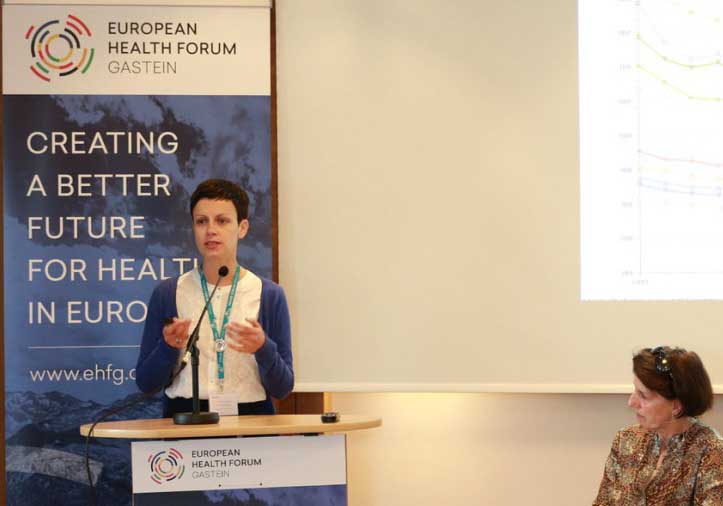Cities as entry points in prevention of noncommunicable diseases (NCDs)

framez../EHFG
With NCDs accounting for more than 80% of the total deaths in the Baltic Sea Region, the successful experiences of tackling NCDs in three cities of the region provided valuable learning at the 19th European Health Forum Gastein on 28 September 2016.
The experiences from the WHO European Healthy Cities network were shared during a WHO workshop exploring future innovative and multisectoral solutions to the rising health costs and social burden of noncommunicable diseases.
Three examples of healthy cities fighting NCDs presented at the workshop
- Turku (Finland), promoting physical activity for all,
- Riga (Latvia) with its wide healthy diet campaign and
- Kuressaare (Estonia) project on reducing availability of alcohol for young people
Ms Karolina Mackiewicz from Baltic Region Healthy Cities Association, WHO Collaborating Centre on Healthy Cities and Urban Health in the Baltic Region, presented the cases and underllined that intersectoral action including a broad collaboration with NGOs, sports and cultural institutions and private businesses were key to the success of these cities.
Healthy Cities Network tackling inequalities
While a decrease in the mortality of NCDs is visible in the region, inequalities in progress are seen both within and in between countries.
Ms Mackiewicz explained the need for WHO support in reducing these inequities commenting that,
“The WHO Healthy Cities network is important in supporting cities to fight noncommunicable diseases by providing frameworks for cross-sectoral cooperation for equity, empowerment and sustainable development.”
The importance of Healthy Cities in preventing NCDs
According to a study conducted by the Collaborating Centre, Health in All Policies as an approach to tackle risk factors of noncommunicable diseases and inequities is recognized by all countries and included in national health plans or strategies. Nevertheless, many cities continue to struggle to implement the approach at the municipal level due to lack of procedures and capacity, showing the growing need for the Healthy Cities Network to continue to strengthen cities in tackling health issues.
In her closing speech Dr Zsuzsanna Jakab, WHO Regional Director for Europe, highlighted the importance of the Healthy Cities’ work in preventing noncommunicable diseases.
The workshop was chaired by Dr Oleg Chestnov, Assistant Director-General, WHO Noncommunicable diseases and mental health, and facilitated by Dr Yvonne Doyle, Regional Director of Public Health England.



